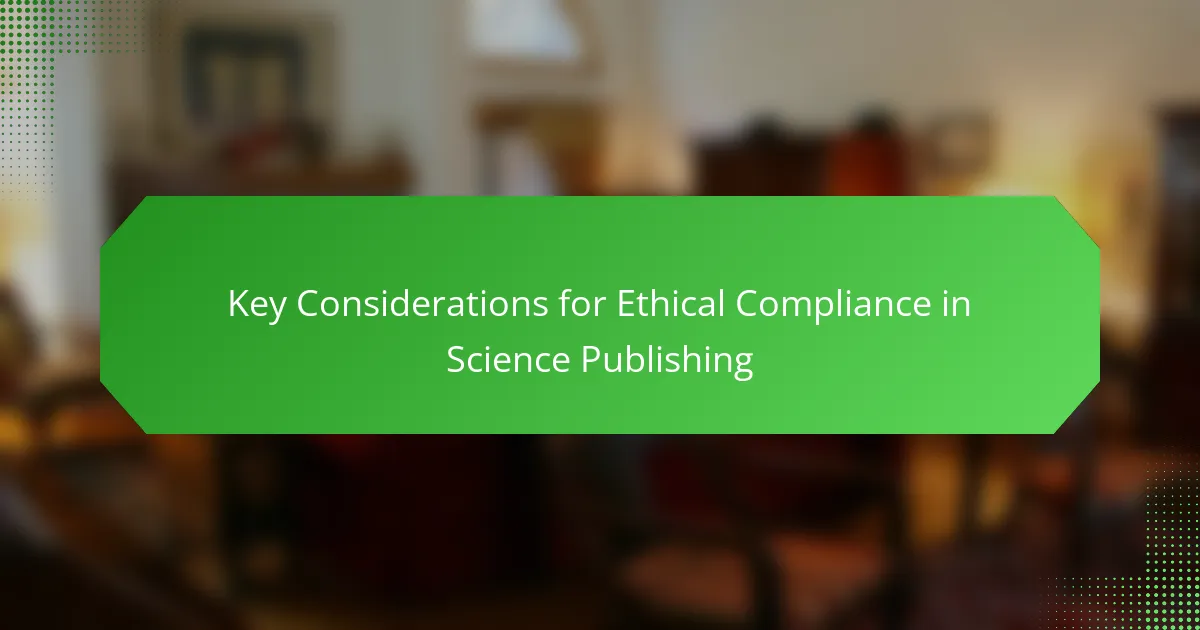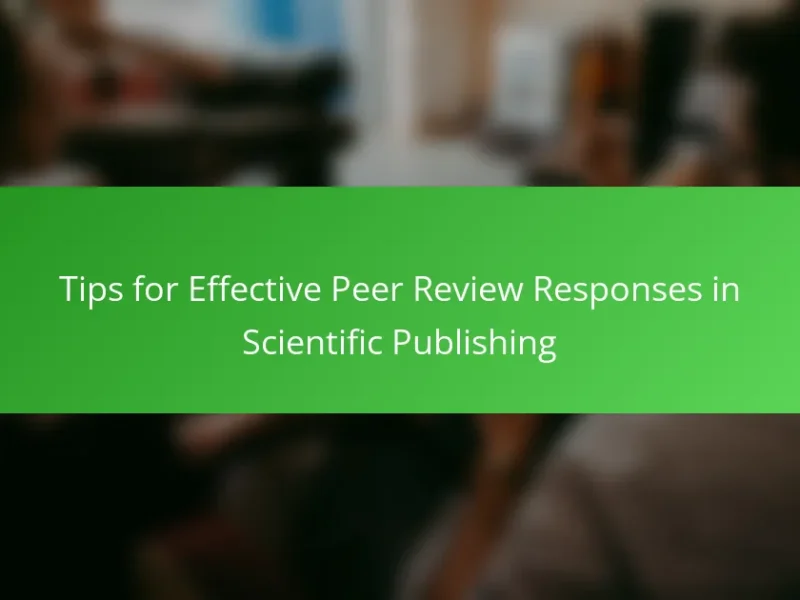Ethical compliance in science publishing encompasses key considerations such as authorship integrity, transparency in funding sources, and adherence to research ethics. Ensuring authorship integrity guarantees that all contributors receive proper credit, while transparency in funding helps prevent conflicts of interest. Adhering to research ethics is essential for conducting studies responsibly and reporting findings honestly. Authors and publishers play significant roles in maintaining these ethical standards, with authors required to follow established guidelines and publishers enforcing compliance through peer review processes and training resources. Upholding these ethical considerations is vital for maintaining the credibility of scientific literature and public trust in research.
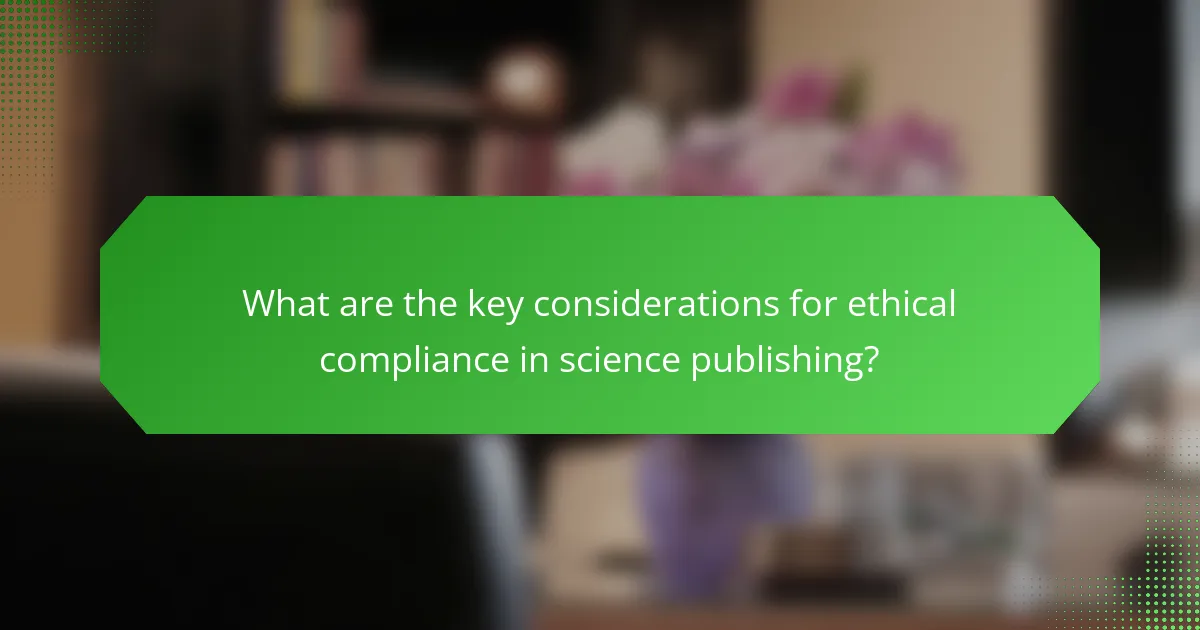
What are the key considerations for ethical compliance in science publishing?
Key considerations for ethical compliance in science publishing include authorship integrity, transparency in funding sources, and adherence to research ethics. Authorship integrity ensures that all contributors receive appropriate credit for their work. Transparency in funding sources prevents conflicts of interest and maintains trust in the research. Adherence to research ethics involves conducting studies responsibly and reporting findings honestly. These considerations are critical for maintaining the credibility of scientific literature. Violations can lead to retractions, damage to reputations, and loss of public trust in science.
Why is ethical compliance important in science publishing?
Ethical compliance is crucial in science publishing to ensure integrity and credibility. It prevents misconduct such as plagiarism, data fabrication, and falsification. These unethical practices can undermine public trust in scientific research. According to a study by the Committee on Publication Ethics (COPE), adherence to ethical standards enhances the quality of published work. Ethical compliance also promotes transparency and accountability in research processes. Furthermore, it encourages responsible authorship and proper attribution of ideas. This fosters a collaborative and respectful academic environment. Ultimately, ethical compliance safeguards the advancement of knowledge and public welfare.
What consequences arise from unethical practices in science publishing?
Unethical practices in science publishing lead to significant consequences. They can result in the dissemination of false or misleading information. This misinformation can misguide future research and public policy. It erodes trust in scientific literature and the peer review process. Researchers may face reputational damage and loss of credibility. Institutions may incur legal liabilities and funding loss. A study by Fanelli (2010) in “PLOS ONE” highlights that misconduct undermines scientific integrity. These consequences emphasize the importance of ethical compliance in science publishing.
How does ethical compliance enhance the credibility of scientific research?
Ethical compliance enhances the credibility of scientific research by ensuring transparency and integrity in the research process. When researchers adhere to ethical standards, they minimize the risk of bias and misconduct. This fosters trust among the scientific community and the public. Studies show that research with ethical oversight is more likely to be reproducible and reliable. For instance, a 2018 report from the National Institutes of Health highlighted that ethical compliance significantly reduces instances of data fabrication. Thus, ethical practices not only uphold the validity of findings but also reinforce public confidence in scientific inquiry.
What are the fundamental principles of ethical compliance in science publishing?
The fundamental principles of ethical compliance in science publishing include integrity, transparency, and accountability. Integrity ensures that research is conducted honestly and without fabrication or falsification. Transparency involves clear disclosure of conflicts of interest and funding sources. Accountability means that authors and publishers take responsibility for the content and its implications. These principles are essential for maintaining trust in the scientific community. They guide the peer review process, ensuring that evaluations are fair and unbiased. Adhering to these principles helps uphold the quality and credibility of published research.
What role does integrity play in scientific publishing?
Integrity is fundamental in scientific publishing as it ensures the credibility and reliability of research findings. It fosters trust among researchers, institutions, and the public. Integrity involves honesty in data reporting and transparency in the research process. When researchers uphold integrity, they contribute to the advancement of knowledge. A study published in the journal “Nature” highlights that integrity prevents misconduct such as data fabrication and plagiarism. This commitment to ethical standards enhances the overall quality of scientific literature. Ultimately, integrity underpins the scientific method and promotes a culture of accountability.
How does transparency influence ethical compliance?
Transparency enhances ethical compliance by fostering accountability and trust within organizations. When processes and decisions are openly communicated, stakeholders are more likely to adhere to ethical standards. Research shows that organizations with transparent practices experience lower instances of misconduct. For example, a study by the Ethics Resource Center found that transparency correlates with higher employee reporting of unethical behavior. This indicates that when individuals feel they are in an open environment, they are more likely to act ethically. Furthermore, transparency helps to establish clear expectations regarding ethical behavior. This clarity reduces ambiguity and promotes adherence to established guidelines.
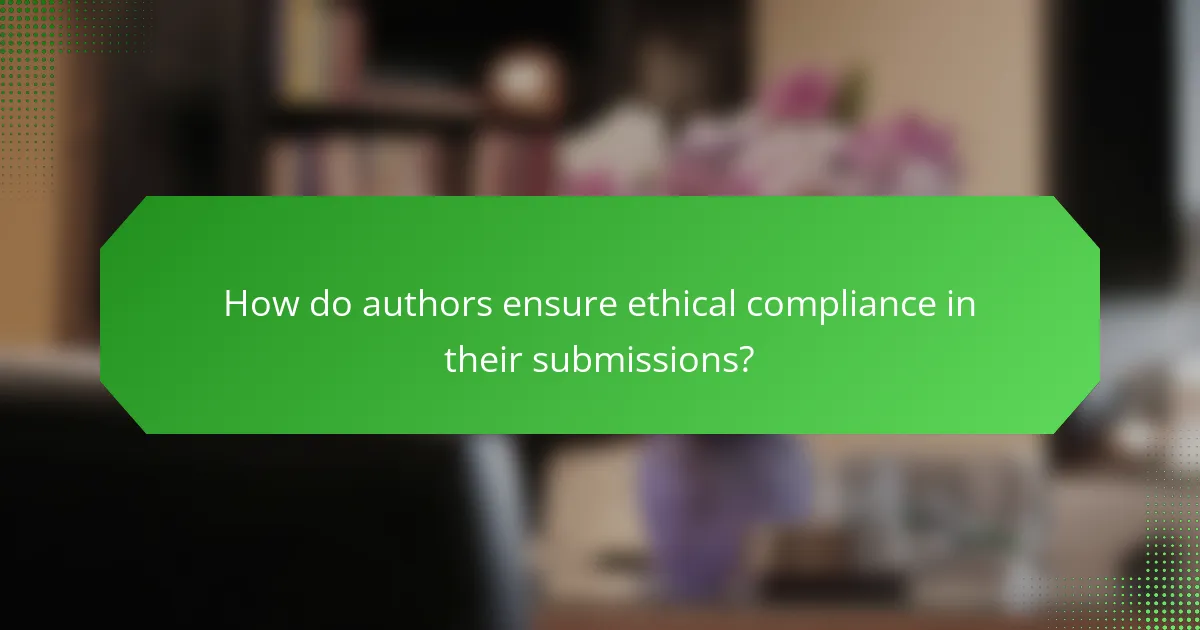
How do authors ensure ethical compliance in their submissions?
Authors ensure ethical compliance in their submissions by adhering to established guidelines and standards. They familiarize themselves with the ethical policies of journals and funding bodies. Proper citation of sources is critical to avoid plagiarism. Authors also disclose any potential conflicts of interest transparently. They obtain necessary permissions for using third-party materials. Following ethical guidelines for research involving human or animal subjects is essential. Many journals require authors to submit ethical approval statements. This process helps maintain integrity in scientific publishing.
What steps should authors take to avoid plagiarism?
Authors should take several steps to avoid plagiarism. First, they must properly cite all sources of information. This includes direct quotes, paraphrased ideas, and any data that is not common knowledge. Second, authors should use plagiarism detection tools to check their work before submission. These tools can identify unintentional similarities with existing texts. Third, they should maintain clear notes on their research process. This helps track sources and ideas accurately. Fourth, authors should understand the specific citation style required by the publication. Different fields have different standards for citation. Finally, they should seek guidance from mentors or colleagues if unsure about proper attribution. These steps collectively help ensure that authors maintain ethical compliance in their work.
How can authors properly cite sources to maintain ethical standards?
Authors can properly cite sources by following established citation styles. Common styles include APA, MLA, and Chicago. Each style has specific guidelines for formatting citations. Authors should include all necessary information, such as author names, publication dates, and titles. Accurate citations give credit to original authors and avoid plagiarism. Proper citation practices are essential for maintaining academic integrity. According to the American Psychological Association, proper citation is crucial for ethical writing. Misrepresenting sources can lead to serious ethical violations.
What tools can assist in detecting plagiarism?
Plagiarism detection tools include Turnitin, Grammarly, and Copyscape. Turnitin is widely used in educational institutions. It checks submitted work against a large database of sources. Grammarly offers a plagiarism checker as part of its writing assistance tools. Copyscape is popular for web content and checks for duplicate content online. These tools help maintain academic integrity and ensure originality in writing. They provide reports that highlight potential plagiarism issues. Using these tools can enhance the credibility of published work.
How can researchers manage conflicts of interest?
Researchers can manage conflicts of interest by disclosing any potential conflicts to relevant stakeholders. Transparency is essential in maintaining trust and integrity in research. Researchers should provide clear statements about financial support, affiliations, or personal interests that could influence their work. Institutional guidelines often require such disclosures before publication. Additionally, researchers can seek guidance from ethics committees or institutional review boards. Regular training on ethical standards can also help researchers identify and mitigate conflicts. By implementing these practices, researchers can uphold ethical compliance in science publishing.
What constitutes a conflict of interest in science publishing?
A conflict of interest in science publishing occurs when an author’s personal, financial, or professional interests could potentially influence their research outcomes. Such conflicts can arise from relationships with funding bodies, personal affiliations, or financial investments in related companies. For example, if a researcher receives funding from a pharmaceutical company, their findings may be biased towards favorable results for that company. Transparency about these interests is crucial for maintaining integrity in the publication process. The Committee on Publication Ethics (COPE) emphasizes that disclosing conflicts helps ensure the credibility of scientific literature.
How should authors disclose potential conflicts of interest?
Authors should disclose potential conflicts of interest clearly and transparently. This disclosure should be included in the manuscript, typically in a designated section. Authors must specify any financial, personal, or professional relationships that could influence their work. This includes funding sources, affiliations, and any relevant personal interests. Transparency in these disclosures fosters trust and integrity in scientific publishing. Many journals require this information to ensure ethical compliance. The International Committee of Medical Journal Editors (ICMJE) emphasizes the importance of such disclosures for maintaining ethical standards.
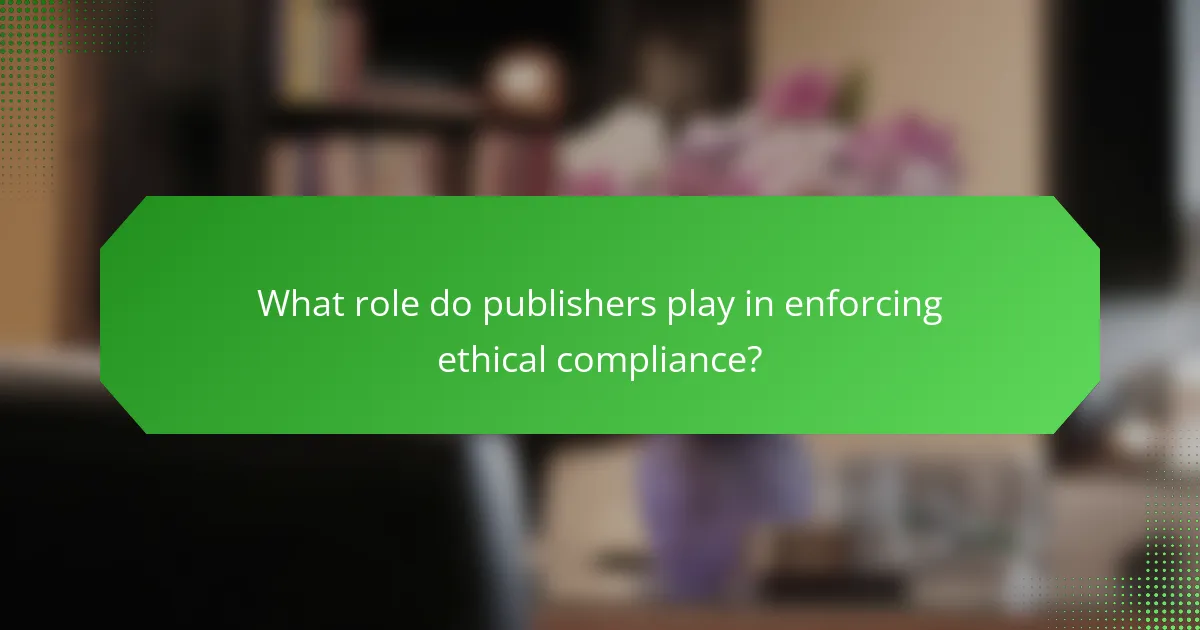
What role do publishers play in enforcing ethical compliance?
Publishers play a critical role in enforcing ethical compliance in science publishing. They establish guidelines and standards that authors must follow. These guidelines often include rules on plagiarism, data fabrication, and authorship disputes. Publishers also implement peer review processes to ensure the integrity of the research. They may retract articles that violate ethical standards after investigation. Furthermore, publishers often provide training and resources to educate researchers on ethical practices. The presence of a robust ethical framework helps maintain public trust in scientific literature. Studies show that adherence to ethical standards improves the quality of published research.
How do publishers establish ethical guidelines for submissions?
Publishers establish ethical guidelines for submissions through a structured process. They begin by reviewing existing ethical standards in the publishing industry. Organizations like the Committee on Publication Ethics (COPE) provide frameworks that guide publishers. Publishers then tailor these guidelines to their specific needs and practices. They often consult with experts in ethics and legal matters during this process. Feedback from authors and reviewers also shapes the guidelines. Once established, these guidelines are published on the publisher’s website for transparency. Regular updates ensure that the guidelines remain relevant to evolving ethical standards.
What are the common ethical guidelines set by publishers?
Common ethical guidelines set by publishers include integrity, transparency, and accountability. Publishers must ensure that all published work is original and properly attributed. They should avoid conflicts of interest and disclose any funding sources. Peer review processes must be fair and unbiased. Publishers are responsible for correcting any errors or retractions in published works. Additionally, they should protect the confidentiality of authors and reviewers. These guidelines help maintain trust in the scientific publishing process.
How do publishers handle allegations of ethical misconduct?
Publishers handle allegations of ethical misconduct through established investigation processes. They typically initiate a formal inquiry upon receiving a complaint. This inquiry may involve gathering evidence and interviewing relevant parties. Publishers often adhere to guidelines set by organizations like the Committee on Publication Ethics (COPE). Transparency is crucial, and many publishers disclose the outcomes of investigations. They may impose sanctions, such as retraction of articles or bans on authors. The goal is to maintain integrity and trust in the publishing process. Evidence of these practices can be found in COPE’s guidelines and case studies.
What is the significance of peer review in maintaining ethical standards?
Peer review is significant in maintaining ethical standards in scientific publishing. It serves as a quality control mechanism for research. Reviewers evaluate the validity, significance, and originality of submitted work. This process helps prevent the dissemination of flawed or unethical research. According to a study published in “Nature,” peer review can identify issues like plagiarism and data fabrication. The scrutiny from experts ensures accountability among researchers. This fosters trust in published findings. Ultimately, peer review upholds the integrity of the scientific community.
How does the peer review process contribute to ethical compliance?
The peer review process enhances ethical compliance by ensuring that research meets established standards. It involves independent experts evaluating the quality and integrity of submitted work. This scrutiny helps identify potential ethical issues, such as plagiarism or data fabrication. Reviewers assess the validity of the research methods and results. Their feedback often leads to revisions that improve the study’s ethical rigor. This process promotes transparency and accountability in scientific publishing. Studies show that rigorous peer review reduces the likelihood of unethical practices in published research. Overall, peer review serves as a critical checkpoint for upholding ethical standards in science.
What challenges do peer reviewers face in upholding ethical standards?
Peer reviewers face several challenges in upholding ethical standards. First, they often encounter conflicts of interest that can compromise objectivity. For example, a reviewer may have personal or professional ties to the authors. Second, the pressure to provide timely reviews can lead to rushed evaluations, increasing the risk of overlooking ethical issues. Third, the anonymity of the peer review process can hinder accountability. Reviewers may feel less compelled to adhere to ethical standards without transparency. Fourth, there is a lack of standardized guidelines for ethical review practices across disciplines. This inconsistency can create confusion regarding expectations. Lastly, reviewers may struggle with the emotional burden of rejecting work they believe has merit but fails to meet ethical criteria. These challenges are documented in studies highlighting peer review’s complexities, such as “The Peer Review Process: A Review of the Literature” by Smith et al. (2020).
What best practices can researchers follow for ethical compliance?
Researchers can follow several best practices for ethical compliance. They should obtain informed consent from all participants involved in their studies. This ensures that individuals understand the purpose and risks associated with the research. Researchers must also ensure confidentiality and anonymity of participant data. This protects the privacy of individuals and fosters trust in the research process.
Adhering to institutional review board (IRB) guidelines is essential. IRBs review research proposals to ensure ethical standards are met. Researchers should also report any conflicts of interest transparently. This maintains the integrity of the research findings.
Additionally, researchers must accurately represent their findings. Misrepresentation can lead to misinformation and harm public trust in science. Finally, they should engage in ongoing education about ethical standards in research. This helps researchers stay updated on best practices and emerging ethical issues.
How can researchers stay updated on ethical standards in publishing?
Researchers can stay updated on ethical standards in publishing by regularly consulting relevant guidelines from established organizations. Key organizations include the Committee on Publication Ethics (COPE) and the International Committee of Medical Journal Editors (ICMJE). These organizations provide resources and updates on best practices. Researchers should also subscribe to newsletters from these organizations for timely updates. Attending workshops and conferences focused on publishing ethics is beneficial. Engaging with peer networks can facilitate knowledge sharing on ethical issues. Additionally, following academic journals that prioritize ethical compliance can offer insights into evolving standards.
What resources are available for guidance on ethical compliance in science publishing?
Resources available for guidance on ethical compliance in science publishing include the Committee on Publication Ethics (COPE) and the International Committee of Medical Journal Editors (ICMJE). COPE provides a framework for best practices in publication ethics. Their website offers detailed guidelines and flowcharts for editors and authors. ICMJE outlines ethical standards specifically for medical journals. Additionally, the World Association of Medical Editors (WAME) provides resources on editorial practices and ethics. These organizations publish codes of conduct and educational materials to help researchers navigate ethical dilemmas.
The main entity of this article is ethical compliance in science publishing. The article outlines key considerations such as authorship integrity, transparency in funding sources, and adherence to research ethics, emphasizing their importance in maintaining the credibility of scientific literature. It discusses the consequences of unethical practices, the fundamental principles guiding ethical compliance, and the roles of authors and publishers in upholding these standards. Additionally, it highlights best practices for researchers to ensure ethical conduct and the resources available for guidance on ethical compliance in the field.
